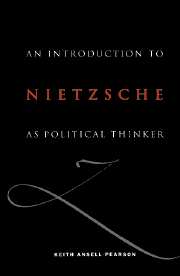Book contents
- Frontmatter
- Contents
- Acknowledgements
- Note on the texts and abbreviations
- Chronology of Nietzsche's life
- Introduction
- A note on Nietzsche and liberalism
- I THE QUESTION OF NIETZSCHE
- II ANCIENTS AND MODERNS
- 3 Nietzsche and the Greeks: culture versus politics
- 4 Nietzsche on modern politics
- III MAN AND OVERMAN
- IV THE QUESTION OF NIETZSCHE NOW
- Notes
- Bibliography
- Guide to further reading
- Index
4 - Nietzsche on modern politics
Published online by Cambridge University Press: 10 November 2009
- Frontmatter
- Contents
- Acknowledgements
- Note on the texts and abbreviations
- Chronology of Nietzsche's life
- Introduction
- A note on Nietzsche and liberalism
- I THE QUESTION OF NIETZSCHE
- II ANCIENTS AND MODERNS
- 3 Nietzsche and the Greeks: culture versus politics
- 4 Nietzsche on modern politics
- III MAN AND OVERMAN
- IV THE QUESTION OF NIETZSCHE NOW
- Notes
- Bibliography
- Guide to further reading
- Index
Summary
INTRODUCTION: ENLIGHTENMENT AND REVOLUTION
The writings of the period 1878–82 contain a set of coherent and instructive insights into the realities and dilemmas of modern social existence. In these writings we find a Nietzsche championing the aims of the Enlightenment, and promoting the cause of a rationalist, critical theory.
It is here that Nietzsche first begins his archaeological excavation of the historical evolution of moral concepts and judgements. Casting off the comforts of Schopenhauerian metaphysics he now supports modern philosophy in its attack on all unexamined authority, whether that authority be religious and metaphysical, moral or political. He supports the Enlightenment, but condemns any attempt to develop a philosophy of revolution out of its challenge to illegitimate authority. An opposition between ‘enlightenment’ and ‘revolution’ is presented in terms of a contrast between Rousseau and Voltaire. For Nietzsche a philosophy of revolution suffers from the delusion that once a social order has been overturned then ‘the proudest temple of fair humanity will at once rise up of its own accord’. The modern theory of revolution is derived from Rousseau's belief that beneath the layers of civilisation there lies buried a natural human goodness; the source of corruption lies not within man, in human nature, but in the institutions of the state and society, and in education.
- Type
- Chapter
- Information
- An Introduction to Nietzsche as Political ThinkerThe Perfect Nihilist, pp. 83 - 98Publisher: Cambridge University PressPrint publication year: 1994



